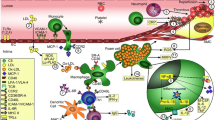Summary
All stages of atherosclerotic plaques are characterized by an inflammatory component, in which T lymphocytes and macrophages orchestrate lesion progression and destabilization by releasing cytokines (e.g., interferon-γ, tumor necrosis factor-α, tissue factor). At the extreme end of this process plaque rupture occurs, which may manifest clinically as an acute coronary syndrome. Hence, measuring this atherosclerosis-inherent inflammation may help predicting cardiovascular events. Accordingly, different soluble inflammatory markers were studied for their predictive value in acute coronary syndromes. Special attention was paid to high-sensitivity C-reactive protein (hs-CRP) and soluble CD40 ligand (sCD40L). The latter seems not only to be a marker of inflammation and platelet activation, but is suggested to directly destabilize atherosclerotic plaques by stimulating pro-inflammatory T lymphocytes. Therefore, reduction of soluble inflammatory markers is an attractive target for future therapeutic strategies. Statins and glycoprotein IIb/IIIa antagonists, well-established treatments in acute coronary syndromes, were demonstrated to decrease hs-CRP and sCD40L. Whether this reduction translates into a better prognosis has to be investigated in further studies.
Zusammenfassung
Die Entstehung und Progression atherosklerotischer Plaques geht mit einer Gefäßwand-Inflammation einher. T-Lymphozyten und Makrophagen stellen die zelluläre Grundlage dieser Entzündung dar. Durch Freisetzen verschiedener Zytokine (z.B. Interferon-γ, Tumor-Nekrose-Faktor-α, Tissue Faktor) tragen T-Lymphozyten und Makrophagen zum Plaquewachstum und schlussendlich zur Plaqueruptur bei. Letztere kann sich klinisch als akutes Koronarsyndrom präsentieren. Verschiedene lösliche Entzündungsstoffe (inflammatorische Marker) wurden in Bezug auf ihren prädiktiven Wert bei akuten Koronarsyndromen untersucht. Dem hochsensitiven C-reaktiven Protein (hs-CRP) und dem löslichen CD40 Liganden (sCD40L) wurde dabei besonderes Interesse gezollt. Letzterer scheint dabei nicht nur ein Marker zu sein, sondern auch kausal als vorwiegend von aktivierten Thrombozyten stammendes pro-inflammatorisches, T-Lymphozyten stimulierendes Molekül eine Rolle bei der Destabilisierung atherosklerotischer Läsionen zu spielen. Die medikamentöse Therapie akuter Koronarsyndrome schließt die Behandlung mit Statinen und Glykoprotein IIb/IIIa Antagonisten ein. Von beiden konnte gezeigt werden, dass sie das hs-CRP und den sCD40L im Blut von Patienten reduzieren. Ob das auch mit einer verbesserten Prognose einhergeht, ist noch nicht endgültig geklärt.
Similar content being viewed by others
Author information
Authors and Affiliations
Corresponding author
Rights and permissions
About this article
Cite this article
Alber, H.F., Suessenbacher, A. & Weidinger, F. The role of inflammation in the pathophysiology of acute coronary syndromes. Wien Klin Wochenschr 117, 445–455 (2005). https://doi.org/10.1007/s00508-005-0399-7
Received:
Accepted:
Published:
Issue Date:
DOI: https://doi.org/10.1007/s00508-005-0399-7




